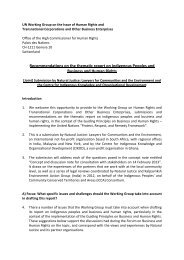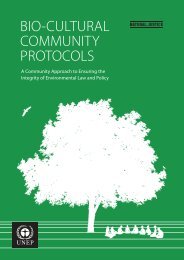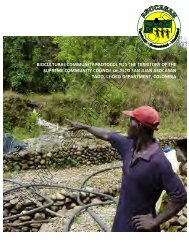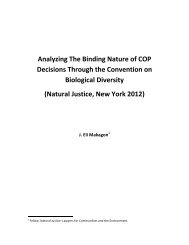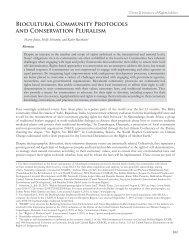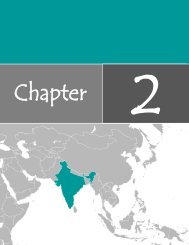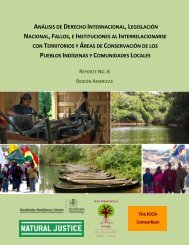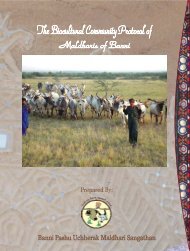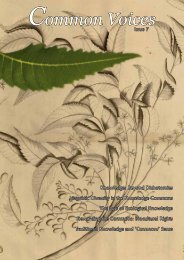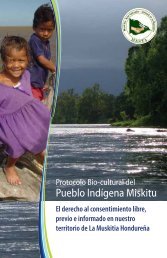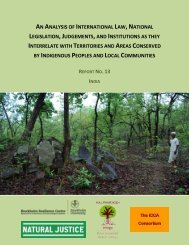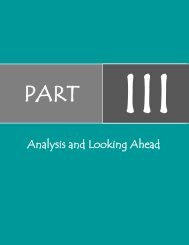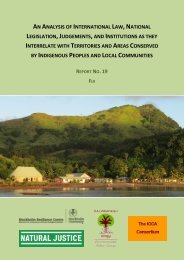English - Natural Justice
English - Natural Justice
English - Natural Justice
Create successful ePaper yourself
Turn your PDF publications into a flip-book with our unique Google optimized e-Paper software.
Create an Enabling Environment for Self-designation and Self-definition ofICCAsStates should pass legislation that recognizes and supports Indigenous peoples and localcommunities to voluntarily designate and define their ICCAs, both within and outside ofnational protected area or conservation systems. This would strengthen the recognition ofIndigenous peoples’ and local communities’ rights and control over their territories whilepromoting more socially and culturally inclusive approaches to conservation. Suchrecognition could include strengthening community capacities for governance andmanagement and should not impose preconditions, institutional arrangements, or strictrequirements such as no-take zones. Only where desired by the peoples and communitiesconcerned, formally recognized ICCAs could also be counted towards sub-national ornational targets for terrestrial, coastal and marine areas under protection.Self-designationSeveral of the laws of the Panamanian Comarcas themselves (for example, the Law of theComarca Embera-Wounaan, the Law of the Comarca Ngobe-Bugle and the Law of theComarca Kuna de Wargandi) include procedures to designate certain areas as conservationareas. Moreover, the Embera-Wounaan Comarca Law grants the authority to administer thepart of the National Park Darien located on its territory to its own traditional authorities, inconjunction with the National Environmental Authority. While the laws of the PanamanianState do not refer to ICCAs, the laws of the Indigenous Comarcas do mention the traditionalmanagement practices in Indigenous peoples’ territories. As the Panamanian State hasrecognized the traditional authorities of Comarcas, it should also recognize the ICCAsestablished by them.Recognize the Full Diversity of Indigenous Peoples and Local Communitiesand Respect the Social, Cultural and Spiritual Values of ICCAsIndigenous peoples and local communities and their ICCAs, found in a wide range ofecosystems and social-cultural settings, are by definition extremely diverse. Legal and policyframeworks must fully respect, recognize and support this diversity without imposing strictcriteria, requirements or qualifications. This requires dominant legal and political systems toembrace a plurality of cultures, laws, worldviews, and epistemologies.Respecting ‘Conservation Pluralism’For most Indigenous peoples in Canada, traditional laws and systems of governance arebased on a concept of interconnectedness. The Algonquin speak of ginawaydaganuk or ‘webof life’ and the Nuu-chah-nulth speak of Hisuk ish ts’awalk or ‘oneness’. In many traditionalIndigenous cosmologies, the connection between the land and humanity is seamless. TheNunavut territorial government has developed its own environmental policy and requiresthe application of Inuit knowledge (Qaujimajatuqangi) for the governance of theenvironment in Nunavut. Avatittinnik Kamatsiarniq, the Inuit Qaujimajatuqangit principle ofenvironmental stewardship, emphasizes the key relationship between people and thenatural world.



